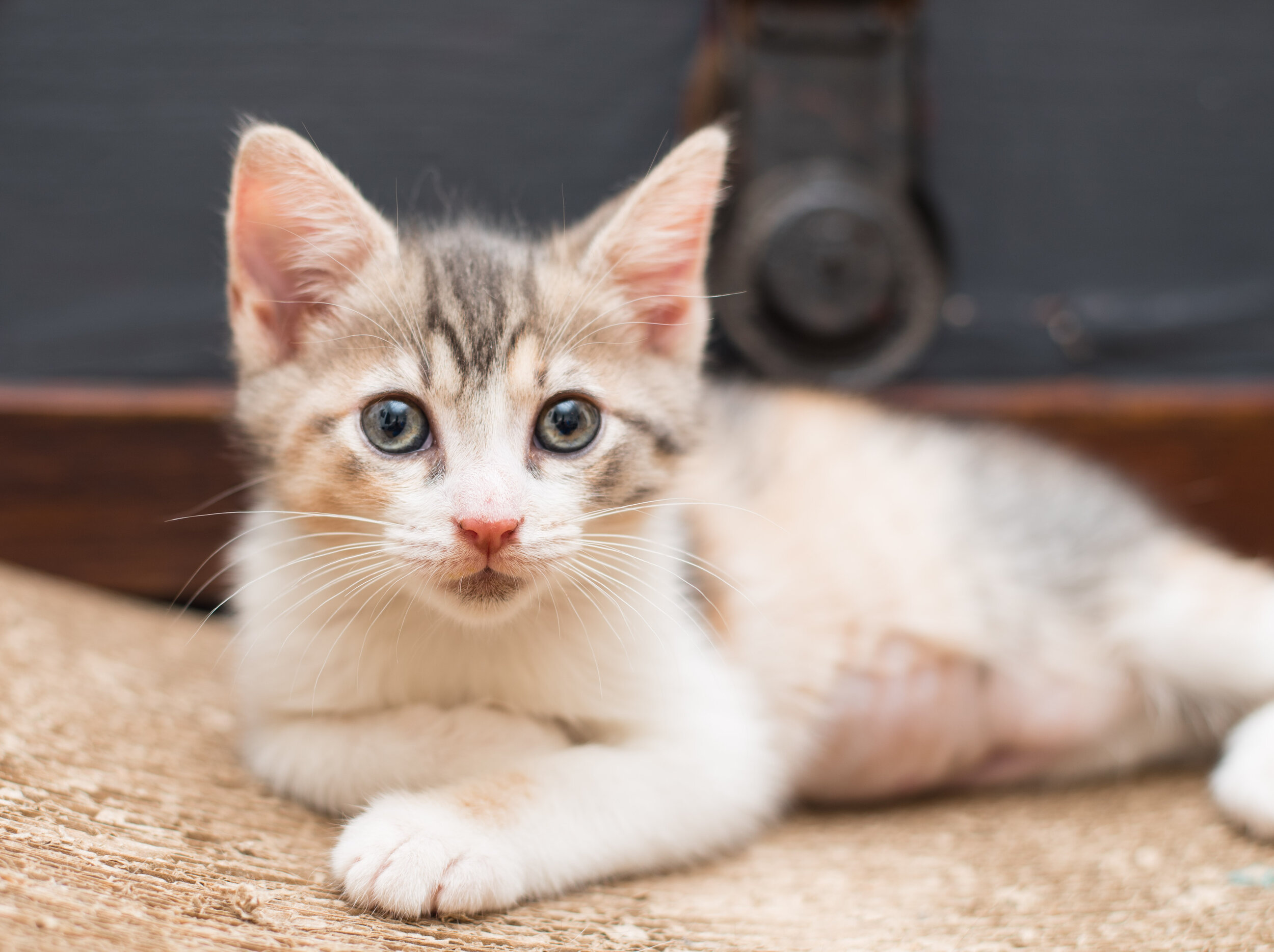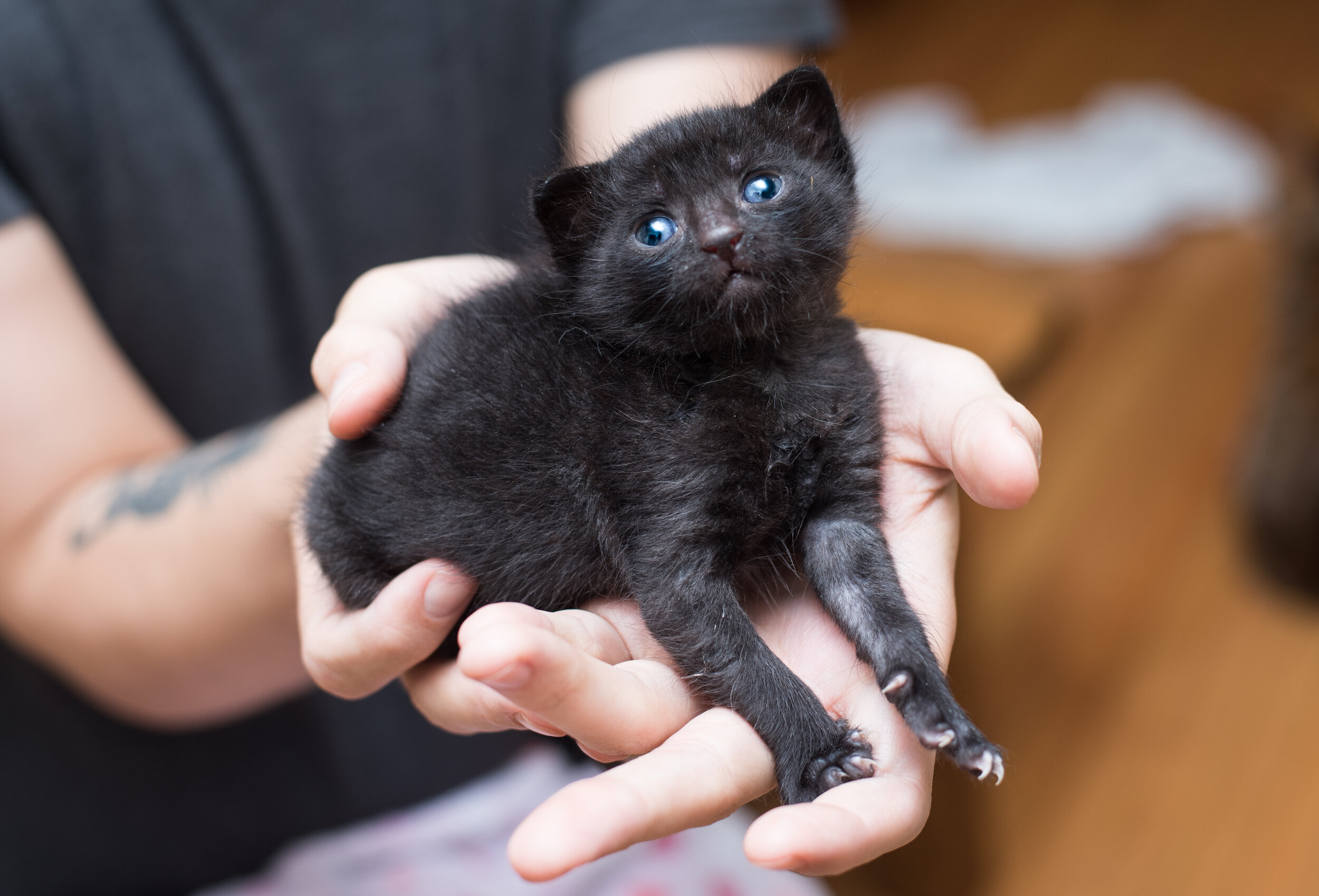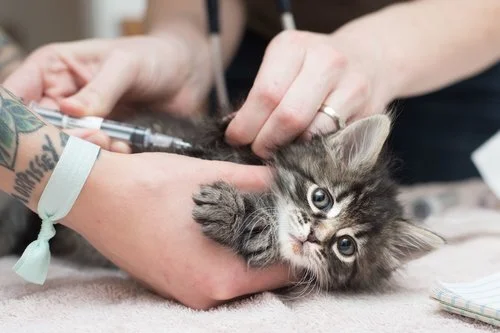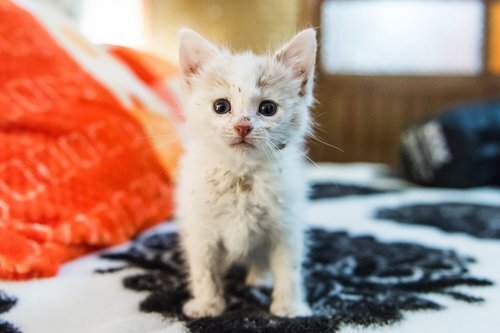Blossom tested positive for FIV at 8 weeks of age. No biggie! She was adopted into a home, and as expected, at 6 months old she tested negative for FIV.
When a kitten tests positive for FIV, it can feel confusing—and maybe even scary—for foster parents and adopters. While it’s perfectly understandable to have worries, the good news is that a positive FIV test in a young kitten is nothing to be terribly concerned about at all. Read on to learn why a kitten who tests positive for FIV is positively adoptable!
Watch a Video About FIV Testing in Kittens
A Positive FIV Test Doesn’t Mean a Kitten Has FIV
Many rescue organizations will test cats for FIV prior to adoption using something called a “snap test” or a “combo test.” It’s important to understand that these tests do not look for the presence of FIV; they only look for the presence of FIV antibodies.
When you’re exposed to a virus, your body mounts an immune response and creates antibodies. Similarly, when cats are exposed to FIV (or an FIV vaccine), they will create antibodies to fight it. When an FIV antibody test shows a positive result, it only means that there are antibodies present. It does not mean that the disease itself is present.
Kittens Can Receive FIV Antibodies From Their Mothers
When a mama cat has FIV (or has been FIV vaccinated), she will have FIV antibodies. When she gives birth, there is a high likelihood that she will pass those antibodies to some or all of the kittens. This does not mean that she was transmitted the disease to them—in fact, while maternal antibody transmission is common, transplacental transmission of the actual disease is extremely uncommon. So when you see a positive FIV result in a kitten, it’s generally just a sign that their mama had FIV and passed the antibodies to her kittens.
Antibodies can be passed to just one littermate, to multiple, or to the entire litter. These maternal antibodies are present during the first months of life, then dissipate completely. By the time the kittens are 6 months of age, they will typically retest negative. For this reason, the test is considered wholly unreliable in young kittens, and many progressive organizations have moved away from testing kittens under 6 months at all.
It’s Common for Kittens to Come from FIV+ Mamas
It’s easy to understand why so many kittens have FIV antibodies—because so many of them come from FIV+ mamas! Approximately 80% of kittens in the United States are born outdoors to community cats, so if you’ve chosen to adopt from a shelter or rescue, there is a very high likelihood that the kitten was born in a community cat colony. Unfortunately, FIV can be common in situations where there are high volumes of unsterilized cats interacting, such as an unmanaged community cat colony. For this reason, it’s not uncommon for kittens to come from a mama who was exposed to FIV, and who passed the antibodies to her babies. Remember that this does not mean she passed the disease to them!
It’s Uncommon for Young Kittens to Truly Have FIV
Even though kittens may test positive for antibodies, it’s actually very unlikely for a kitten who was rescued at a young age to truly have FIV, because they generally are too young to participate in the kinds of activities that expose them to the disease. FIV is primarily transmitted through deep bite wounds, which usually occur during either aggressive fights or sexual intercourse with an FIV positive cat, both of which baby kittens are generally too young to do. This is just one more reason that a positive antibody test is typically more of a signifier of the mother’s status than that of the kitten.
Kittens with Positive Tests Can (and Should) Still Be Adopted!
Sprout (left) tested negative for FIV, but was still adopted out with Blossom (right), who tested positive. Even in the event that a kitten does truly have FIV, they can live safely with other cats of any status—as long as everyone is spayed and neutered and coexisting peacefully!
Many progressive rescue organizations are moving away from FIV testing young kittens at all. However, if your kitten was tested and received a positive result, you should still move forward with adoption — and simply make a plan to retest the kitten at 6 months of age. Kittens with a positive FIV test can still be adopted into homes with other FIV-negative cats, or adopted out with a littermate regardless of the littermate’s status.
Rescue organizations should not delay adoption, and should simply provide adopters with appropriate education and disclosure about the status, as well as a recommendation to retest at 6 months of age. A positive FIV test should never be a reason to hold back a kitten from finding and joining a loving forever home!
Retest the Kitten at 6 Months of Age
Once a kitten has reached 6 months, maternal antibodies will generally have dissipated, and you will be able to obtain a more accurate test result. In most cases, the kitten will retest negative, and be FIV-free!
If a kitten is still positive, it is recommended to do a confirmatory test called a PCR. Learn more about confirmatory testing methods here.
There is always a (very) small chance that a kitten has truly been exposed to the disease as a baby, and that she will retest positive. In the event that the kitten does retest positive—don’t fear! Cats can and do live long, happy lives with FIV, and they can safely live in homes with FIV negative cats as long as everyone is spayed and neutered and coexisting peacefully.
To Summarize…
A positive FIV combo test only means that the kitten has FIV antibodies, not the disease itself
These antibodies are generally maternal antibodies passed from an FIV positive mother
It’s common for rescued kittens to come from FIV positive mothers, but not common for them to have FIV themselves
A positive FIV test should never delay adoption; the kitten should simply be retested at 6 months of age





